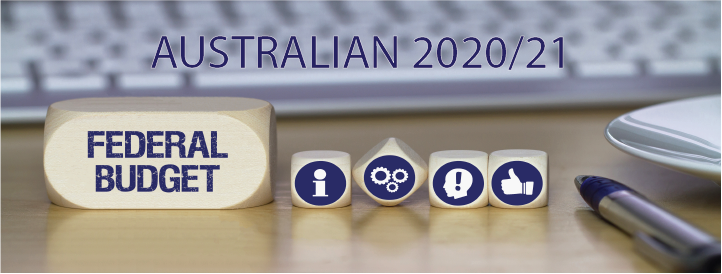Australian 2020/21 Budget & it impacts on Logistics

The Australian 2020/2021 Budget announcement brings positive changes to the working Australians despite the trillion-dollar debt the country faces due to the impacts of Covid-19.
With many alterations in the budget accounting for our national workforce, maternity cover, health services, infrastructure, business owners, the environment, and tech, it is important to understand how the new budget will impact the logistics industry and its workers.
A commitment to make trade simpler was a key theme announced in the 20/21 budget. With a focus on simplifying measures to assist our agriculture exporters and continue the development of the anticipated single window trade system. Also due to Covid-19, the International Freight Assistance Mechanism (IFAM) has also been extended.
Below provides a summary of the key developments with direct relation to the logistics industry.
SIMPLIFYING TRADE
A number of measures were announced that will assist in simplifying the trade process:
- $7.8 million to reduce compliance complexity for Australian business
- $12.8 million over two years from 2020-21 to develop a new border intervention model for sea and air cargo
- An extension of the Trusted Trader Scheme for a further 3 years. The Government has forecast that this measure will reduce revenue by $7.5 million over 3 years. It is not immediately clear why deferring duty should result in a reduction of, and not simply a deferral, of revenue.
The Government said "Setting the foundations for a Trade Single Window is an important part of this work and will build on reforms of trade regulations and processes to make it easier for businesses to integrate into global supply chains." It is noted that currently, 28 agencies regulate trade at the border, applying more than 120 pieces of Commonwealth regulation. For most traders, it would be enough if the Australian Border Force and the DAWE streamlined their border activities.
INTERNTIONAL FREIGHT ASSSITANCE MECHANISM (IFAM)
The Australian Government announced it is committing an additional $317.1 million in funding to the IFAM support mechanism and has planned to extend to 30 June 2021. This initiative will continue to keep Australian farmers in business by ensuring they can get their high-quality produce into key export markets and that they stay connected with their overseas customers, and ensure access to vital imports including medical supplies. Due to the collapse of passenger flights, this has left a huge hole in air freight availability, so an extension of the IFAM is necessary to continue the smooth flow of trade.
WASTE EXPORT BAN
The Government has provided funding to support the ban of certain types of waste from 1 January 2021. The Department of Agriculture, Water, and Environment (DAWE) will be responsible for administering a licensing and declaration scheme to enable the export of waste materials. It must be demonstrated that sufficient processing has occurred prior to export to prevent harm to the environment or human health overseas. Therefore decreasing the amount of avoidable excess waste.
DIVERSIFYING TRADE
The Government has previously hinted at a need to be less reliant on Chinese trade and has committed $6.6 million to "expanding and diversifying trade". How this will occur has not been stated, but the Government has not been subtle in linking the measure with the free trade negotiations with the EU and the UK. Related to this, the budget estimates continue to make provision for a Free Trade Agreement with India and the conclusion of the Regional Comprehensive Economic Partnership.
For those waiting for a duty free European car, 2022-23 could be the year, with duty on passenger motor vehicles expected to fall from $340 million on 21/22 to $100 in 22/23.
UPGRADES TO AGRICULTURAL EXPORT TRADE SYSTEMS
The Australian Government will invest $222 million over four years in modern agricultural export trade ICT systems. The Government hopes that the funding will reduce the impact to trade from system outages and reduce the regulatory burden on exporters. There will also be $106 million over four years into the targeted regulation of exported goods. Much of the funding will be to take into the digital age an export approval system that is still in many instances paper-based.
LOOKING INTO THE FUTURE
All partners in the supply chain can expect steady volumes over the next year. While exports and imports are expected to each fall by 9%, these decreases are caused by large falls in the import and exports of services, such as education and tourism. The trade of goods should remain steady, especially for the end of 2020 with the lead up to the festive season. However, it's largely guesswork as there has probably never been a harder time predicting the future economic performance of our key trading partners.
An overview of the major budget development areas on a national level.
INFRASTRUCTURE
Directly impacting domestic freight services within the logistics industry, the Australian government is allocating a total of $10 billion dollars to the redevelopment of major infrastructure areas to keep Australia running smoothly. This $10b is directed towards:
- $7.5 billion in road and rail projects spread across all states and territories.
- Around $3b of this will be used to fast track major road projects throughout all states, decreasing the overall travel time and improvements to the road quality and safety. To read more about which specific projects are fast-tracked, click here.
- $53 million in gas infrastructure
- $211 million provided for Australia's domestic fuel security.
TECHNOLOGY
To assist in tracking and online services within the logistics industry, the allocations for national technology are impressive:
- $4.5b NBN upgrade will replace copper lines and older hardware
- $29.3 million for 5G trials in industries including agriculture and manufacturing
- $1.67b for cybersecurity
- $260m for digital identity system for businesses
- $3bn compo scheme "for damage caused" by our national space program
ENVIRONMENT
With sustainability and environment health being a major trend in logistics currently, the Australian government are listening to its citizens by becoming a more ecofriendly nation
One allocation of the budget that could directly impact all areas of freight is the $1.9 billion dollar funding to support low emissions and renewable technologies, helping to lower emissions and address climate change. This could drive change in fuel types, air traffic, shipping lines, and sustainable alternatives for domestic freight.
Another that could directly impact sea freight imports and exports is the $47.4m that is being spread over four years for ocean health. This allocation of the budget could see actions for cleaning up the ocean and our beaches but also the frequency of cargo ships, fuel types, and sustainable ports.
TGL continues to support our trade partners by assisting wherever possible and providing information when requested.
We will continue to monitor the Australian 2020/2021 budget landscape and provide updates where necessary.


